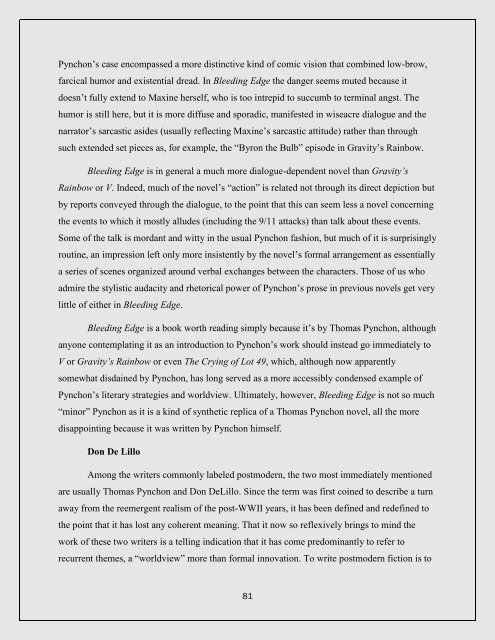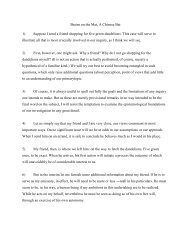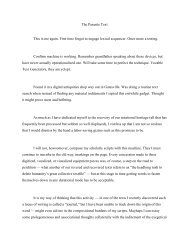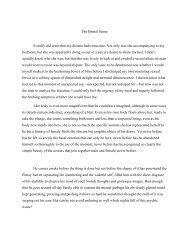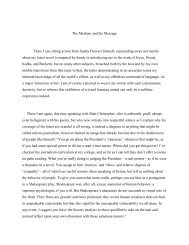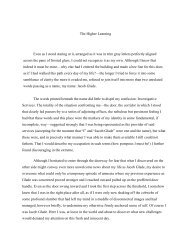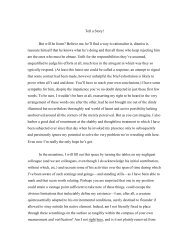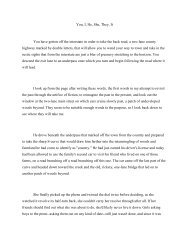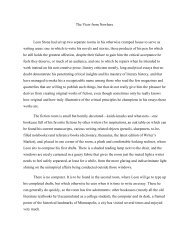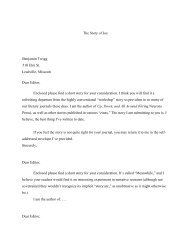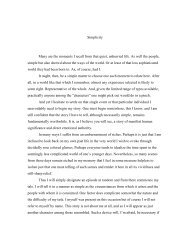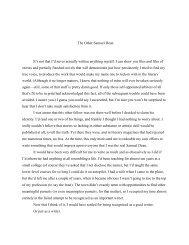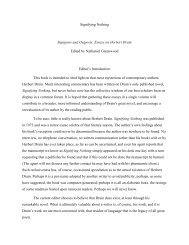APF
Create successful ePaper yourself
Turn your PDF publications into a flip-book with our unique Google optimized e-Paper software.
Pynchon’s case encompassed a more distinctive kind of comic vision that combined low-brow,<br />
farcical humor and existential dread. In Bleeding Edge the danger seems muted because it<br />
doesn’t fully extend to Maxine herself, who is too intrepid to succumb to terminal angst. The<br />
humor is still here, but it is more diffuse and sporadic, manifested in wiseacre dialogue and the<br />
narrator’s sarcastic asides (usually reflecting Maxine’s sarcastic attitude) rather than through<br />
such extended set pieces as, for example, the “Byron the Bulb” episode in Gravity’s Rainbow.<br />
Bleeding Edge is in general a much more dialogue-dependent novel than Gravity’s<br />
Rainbow or V. Indeed, much of the novel’s “action” is related not through its direct depiction but<br />
by reports conveyed through the dialogue, to the point that this can seem less a novel concerning<br />
the events to which it mostly alludes (including the 9/11 attacks) than talk about these events.<br />
Some of the talk is mordant and witty in the usual Pynchon fashion, but much of it is surprisingly<br />
routine, an impression left only more insistently by the novel’s formal arrangement as essentially<br />
a series of scenes organized around verbal exchanges between the characters. Those of us who<br />
admire the stylistic audacity and rhetorical power of Pynchon’s prose in previous novels get very<br />
little of either in Bleeding Edge.<br />
Bleeding Edge is a book worth reading simply because it’s by Thomas Pynchon, although<br />
anyone contemplating it as an introduction to Pynchon’s work should instead go immediately to<br />
V or Gravity’s Rainbow or even The Crying of Lot 49, which, although now apparently<br />
somewhat disdained by Pynchon, has long served as a more accessibly condensed example of<br />
Pynchon’s literary strategies and worldview. Ultimately, however, Bleeding Edge is not so much<br />
“minor” Pynchon as it is a kind of synthetic replica of a Thomas Pynchon novel, all the more<br />
disappointing because it was written by Pynchon himself.<br />
Don De Lillo<br />
Among the writers commonly labeled postmodern, the two most immediately mentioned<br />
are usually Thomas Pynchon and Don DeLillo. Since the term was first coined to describe a turn<br />
away from the reemergent realism of the post-WWII years, it has been defined and redefined to<br />
the point that it has lost any coherent meaning. That it now so reflexively brings to mind the<br />
work of these two writers is a telling indication that it has come predominantly to refer to<br />
recurrent themes, a “worldview” more than formal innovation. To write postmodern fiction is to<br />
81


